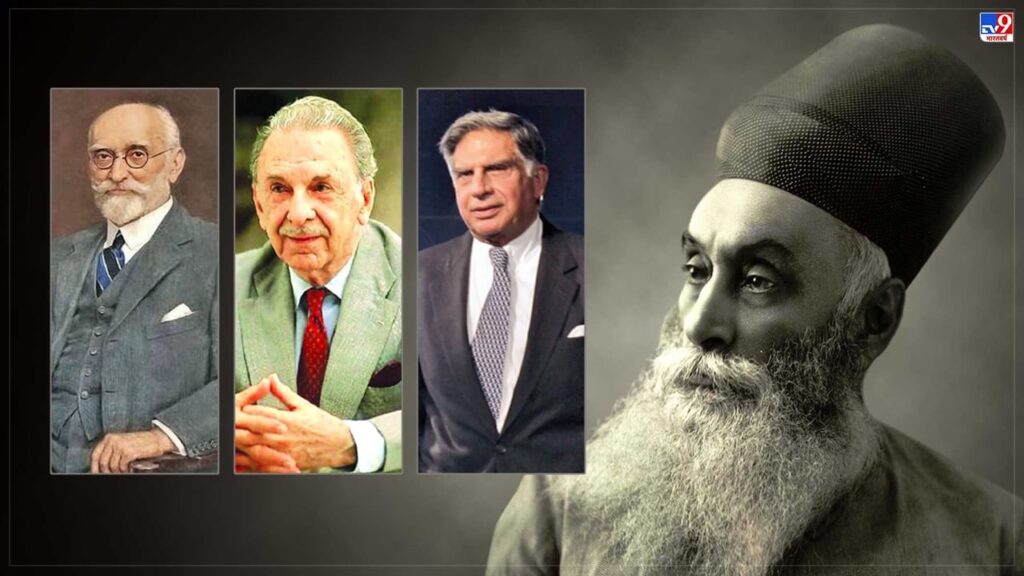The Tata Group is a name that resonates with respect and admiration among Indians. For the current generation, the face of the Tata Group is Ratan Tata. However, delving deeper into the history of the Tata Group reveals a legacy built not just by Ratan Tata, but by several generations of dedicated leadership and philanthropy. The brand value associated with Tata symbolizes trust, and the group has consistently shown the country the path towards a prosperous future. Today, the Tata Group is led by N. Chandrasekaran, marking a significant moment in the group’s almost 150-year history where leadership has often remained within the Tata family.
Jamsetji Tata: The Visionary Founder
Jamsetji Tata, the founder of the Tata Group, hailed from Navsari in Gujarat. His journey took a transformative turn when he relocated to Mumbai. In 1868, he laid the foundation of the Tata Group as a trading company, starting with an investment of ₹21,000 at the young age of 29—a significant sum in those days. The company diversified into shipping and then into textiles by 1869, purchasing an abandoned oil mill and converting it into a textile factory.
Jamsetji Tata is credited with envisioning many remarkable projects, the most notable being the Taj Mahal Palace Hotel in Mumbai, which is now recognized as one of the finest hotel brands in the world. In fact, he was honored as the most philanthropic individual of the century, a testament to his unyielding commitment to societal development.
Dorabji Tata: Building an Industrial Powerhouse
Dorabji Tata, Jamsetji’s son, played a crucial role in transforming the Tata Group into a major industrial conglomerate. In 1907, the establishment of Tata Steel in Jamshedpur marked a significant milestone. The city itself was named after Jamsetji Tata, reflecting the deep roots of the company in the region. Tata Steel pioneered numerous employee welfare initiatives that set precedents for social security in India long before other global companies like Google and Microsoft began to focus on employee satisfaction.
The group implemented housing townships, ensured health facilities for employees, established a provident fund, and even set up creches for working women—far ahead of its time in corporate social responsibility.
J.R.D. Tata: A Catalyst for Change
J.R.D. Tata, a pivotal figure in the Tata Group and India’s industrial landscape, greatly influenced the direction of both the company and the nation. His tenure saw significant transformations, and he became known for his visionary approach, earning him the prestigious Bharat Ratna award.
As India’s first commercial pilot, he founded Tata Airlines in 1932, which later became Air India. The recent privatization that allowed Tata to reclaim Air India was widely celebrated, reflecting public admiration for J.R.D. Tata’s legacy. During his leadership, Tata Group diversified extensively, giving rise to several key companies including Tata Motors, Tata Consultancy Services (TCS), Tata Consumer Products, Tata Salts, Titan, and Lakmé, with Ratan Tata playing a significant role in furthering this legacy.
TCS: A Global IT Leader
Tata Consultancy Services (TCS) is not only the second most valuable IT company in the world but also the largest IT employer globally, with a workforce exceeding 600,000. TCS holds the distinction of being the second-largest company in India by market valuation. This highlights the Tata Group’s substantial impact on both the national and international stages, underlining its commitment to innovation, quality, and employee welfare.
Summary of the Tata Legacy
| Founder | Year Established | Key Contributions |
|---|---|---|
| Jamsetji Tata | 1868 | Founded the Tata Group as a trading company; established the Taj Mahal Palace Hotel; recognized for philanthropy. |
| Dorabji Tata | 1907 | Established Tata Steel; implemented employee welfare programs. |
| J.R.D. Tata | 1932 | Founded Tata Airlines; diversified the company significantly; earned Bharat Ratna. |
| N. Chandrasekaran | Current | Leading the group through modern challenges; continuing the legacy of trust and innovation. |
The Tata Group is more than just a conglomerate; it exemplifies the spirit of entrepreneurship intertwined with social responsibility. Each generation has built upon the previous one’s legacy, creating a multifaceted organization that continues to innovate and lead across industries.

